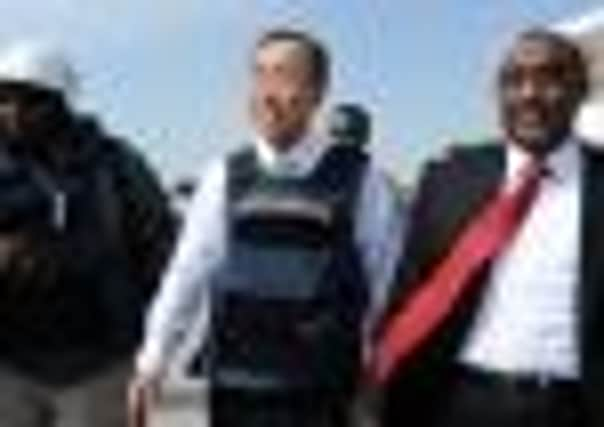18 years on, and UN chief gets very different welcome in Mogadishu


That was in 1993, in the depths of the country’s civil war, when United States forces were withdrawing after the disastrous “Black Hawk Down” mission and the UN and its 28,000 troops were reviled in Mogadishu.
Eighteen years on, Ban Ki-moon found an altogether warmer welcome during his surprise visit yesterday.
Advertisement
Hide AdAdvertisement
Hide AdSecurity officials still insisted he wear a bullet-proof vest, and he was sped through the city’s wrecked streets in a convoy of armoured personnel carriers, but the mere fact he was able to visit what is still considered the world’s most dangerous capital is testament to what one analyst called “dramatic improvements” in recent months.
Al-Qaeda-linked Islamist insurgents are on the run, pushed out of their long-held positions in the city, and squeezed by fresh Kenyan and Ethiopian offensives in the countryside.
The country’s famine, while still dire, with 250,000 people facing imminent starvation, is slowly improving, thanks to a massive international aid response.
And pirate attacks off Somalia’s coast dropped by two-thirds in November compared with the same month last year, European naval officials have reported.
Mr Ban said his visit was in part to celebrate these gains, and he commended both the Somali government and African Union (AU) peacekeepers for their efforts to secure such success.
A significant recognition of these improvements was Mr Ban’s announcement that a key agency, the UN political office on Somalia, would move to Mogadishu from neighbouring Kenya next month – the first time in more than a decade that the UN will have significant numbers of international staff permanently based in the Somali capital.
But buried further into his comments was what analysts identified as the real reason for his visit, which was as much about the business of governing Somalia as it was about the symbolism of solidarity.
International humanitarian and development donations to Somalia will top £800 million this year, with another £200m spent on the AU peacekeeping mission. This support, Mr Ban said, “should not be taken for granted” by Somalia’s transitional federal government (TFG), bankrolled since 2004 by the UN and western nations, including Britain.
Advertisement
Hide AdAdvertisement
Hide AdPresident Sheikh Sharif’s administration, dogged by allegations of corruption, is already slipping behind on a tight reform timetable, designed to lead to democratic elections scheduled for August next year.
The UN has warned that delays to key reforms – to the constitution, parliament, security agencies and the presidency – will jeopardise future international support. “I think it’s fair to say the secretary-general’s visit was in large part an opportunity to underline our seriousness about these timetables, and to encourage the TFG to see that there will be no extension,” one senior UN staffer in Nairobi told The Scotsman.
Few veteran Somalia-watchers hold great hope that the deadlines will be met however. Infighting between politicians and a self-serving policy agenda could see militant Islamic group al-Shabaab or clan warlords return, said Rashid Abdi, senior Somalia researcher with the International Crisis Group.
“The Somali political class may say they are keen on reform, but there’s very little sign in Mogadishu that the government is capitalising on the modest military successes to push their political strategy,” he said. “They appear, in fact, to have no such strategy beyond clinging to power.
“There has been a dramatic improvement in security in Mogadishu, and the government now has the chance to move into these liberated areas. But the longer they leave these areas un-policed and ungoverned, the quicker we will see criminal elements moving in.”